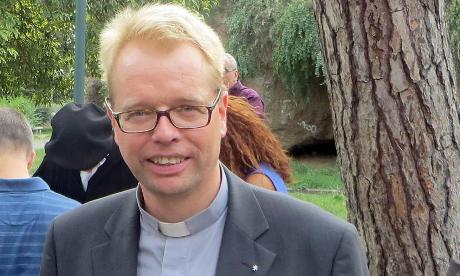Rome’s Lutheran pastor and many in his flock believe Pope Francis has opened the door for intercommunion between Catholics and Lutherans.
Pastor Jens Kruse of Rome’s Evangelical Lutheran Church told the National Catholic Register that Lutherans has felt this door was closed “for an eternity”.
But last month, during a visit to Pastor Kruse’s church, Pope Francis urged a Lutheran woman married to a Catholic to “talk to the Lord” about receiving Catholic communion.
She should then “go forward” the Pope said, but he cautioned that he “wouldn’t ever dare to allow this, because it is not my competence”.
Pastor Kruse said he feels there is “no danger” of a Lutheran receiving the Eucharist “in the wrong way” because he would be “receiving Jesus Christ and not the teachings of the Catholic Church”.
He also stated that the Pope had introduced a new approach to the Eucharist, no longer viewing it as the end of ecumenism, but rather a “gift on the way to unity”.
The pastor said the problem with intercommunion between Catholics and Lutherans is not different beliefs about the Eucharist.
“The problem is the understanding of priesthood,” Pastor Kruse said.
“That creates the differences and the Pope said: ‘No, there’s the presence of Jesus Christ, in the Lutheran and the Catholic Eucharist.’”
Pastor Kruse added: “We’re both part of the Church of Jesus Christ through our Baptism and we have the same faith. There are no big differences, no obstacle to us to do it [worship] together.”
He noted that “Lutherans [already] participate in the Catholic Eucharist and Catholics participate in the Lutheran Eucharist, because for the people, it’s just the same.
“And they are right, because in the theology of the Eucharist there are no great differences.”
“ . . . it’s Jesus Christ who invites us to participate, it’s not the Catholic or Lutheran Church, and it’s not a question of Lutheran dogmas or Catholic dogmas.”
The prefect of the Congregation for Divine Worship recently rejected the idea of wider intercommunion, beyond rare circumstances where baptised non-Catholic Christians can receive Catholic Communion.
Sources
